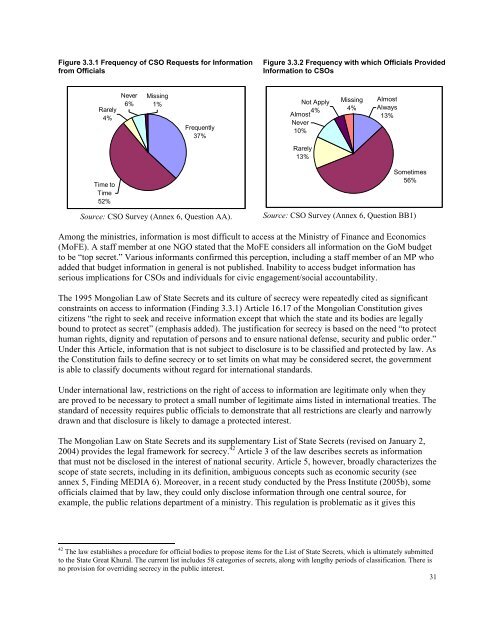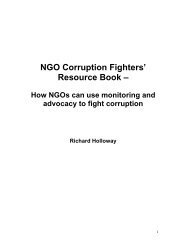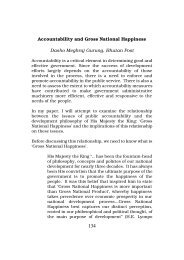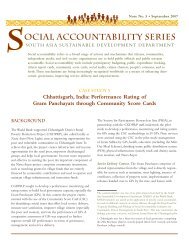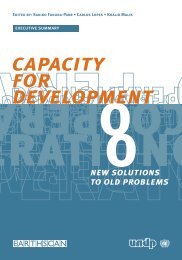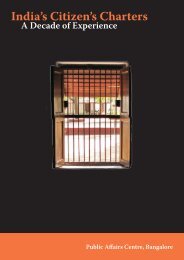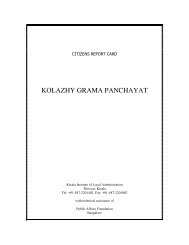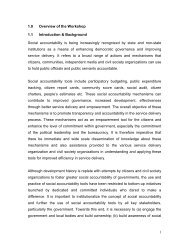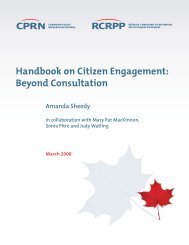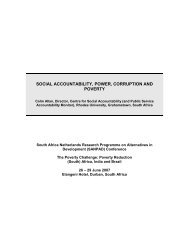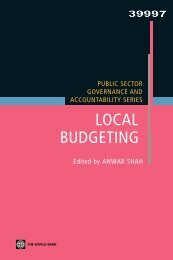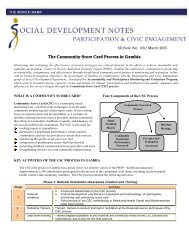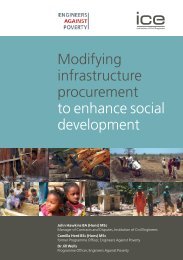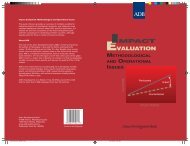Enabling Environment for Social Accountability in ... - SASANet
Enabling Environment for Social Accountability in ... - SASANet
Enabling Environment for Social Accountability in ... - SASANet
Create successful ePaper yourself
Turn your PDF publications into a flip-book with our unique Google optimized e-Paper software.
Figure 3.3.1 Frequency of CSO Requests <strong>for</strong> In<strong>for</strong>mation<br />
from Officials<br />
Figure 3.3.2 Frequency with which Officials Provided<br />
In<strong>for</strong>mation to CSOs<br />
Rarely<br />
4%<br />
Never<br />
6%<br />
Miss<strong>in</strong>g<br />
1%<br />
Frequently<br />
37%<br />
Not Apply<br />
4%<br />
Almost<br />
Never<br />
10%<br />
Miss<strong>in</strong>g<br />
4%<br />
Almost<br />
Always<br />
13%<br />
Rarely<br />
13%<br />
Time to<br />
Time<br />
52%<br />
Source: CSO Survey (Annex 6, Question AA).<br />
Sometimes<br />
56%<br />
Source: CSO Survey (Annex 6, Question BB1)<br />
Among the m<strong>in</strong>istries, <strong>in</strong><strong>for</strong>mation is most difficult to access at the M<strong>in</strong>istry of F<strong>in</strong>ance and Economics<br />
(MoFE). A staff member at one NGO stated that the MoFE considers all <strong>in</strong><strong>for</strong>mation on the GoM budget<br />
to be “top secret.” Various <strong>in</strong><strong>for</strong>mants confirmed this perception, <strong>in</strong>clud<strong>in</strong>g a staff member of an MP who<br />
added that budget <strong>in</strong><strong>for</strong>mation <strong>in</strong> general is not published. Inability to access budget <strong>in</strong><strong>for</strong>mation has<br />
serious implications <strong>for</strong> CSOs and <strong>in</strong>dividuals <strong>for</strong> civic engagement/social accountability.<br />
The 1995 Mongolian Law of State Secrets and its culture of secrecy were repeatedly cited as significant<br />
constra<strong>in</strong>ts on access to <strong>in</strong><strong>for</strong>mation (F<strong>in</strong>d<strong>in</strong>g 3.3.1) Article 16.17 of the Mongolian Constitution gives<br />
citizens “the right to seek and receive <strong>in</strong><strong>for</strong>mation except that which the state and its bodies are legally<br />
bound to protect as secret” (emphasis added). The justification <strong>for</strong> secrecy is based on the need “to protect<br />
human rights, dignity and reputation of persons and to ensure national defense, security and public order.”<br />
Under this Article, <strong>in</strong><strong>for</strong>mation that is not subject to disclosure is to be classified and protected by law. As<br />
the Constitution fails to def<strong>in</strong>e secrecy or to set limits on what may be considered secret, the government<br />
is able to classify documents without regard <strong>for</strong> <strong>in</strong>ternational standards.<br />
Under <strong>in</strong>ternational law, restrictions on the right of access to <strong>in</strong><strong>for</strong>mation are legitimate only when they<br />
are proved to be necessary to protect a small number of legitimate aims listed <strong>in</strong> <strong>in</strong>ternational treaties. The<br />
standard of necessity requires public officials to demonstrate that all restrictions are clearly and narrowly<br />
drawn and that disclosure is likely to damage a protected <strong>in</strong>terest.<br />
The Mongolian Law on State Secrets and its supplementary List of State Secrets (revised on January 2,<br />
2004) provides the legal framework <strong>for</strong> secrecy. 42 Article 3 of the law describes secrets as <strong>in</strong><strong>for</strong>mation<br />
that must not be disclosed <strong>in</strong> the <strong>in</strong>terest of national security. Article 5, however, broadly characterizes the<br />
scope of state secrets, <strong>in</strong>clud<strong>in</strong>g <strong>in</strong> its def<strong>in</strong>ition, ambiguous concepts such as economic security (see<br />
annex 5, F<strong>in</strong>d<strong>in</strong>g MEDIA 6). Moreover, <strong>in</strong> a recent study conducted by the Press Institute (2005b), some<br />
officials claimed that by law, they could only disclose <strong>in</strong><strong>for</strong>mation through one central source, <strong>for</strong><br />
example, the public relations department of a m<strong>in</strong>istry. This regulation is problematic as it gives this<br />
42 The law establishes a procedure <strong>for</strong> official bodies to propose items <strong>for</strong> the List of State Secrets, which is ultimately submitted<br />
to the State Great Khural. The current list <strong>in</strong>cludes 58 categories of secrets, along with lengthy periods of classification. There is<br />
no provision <strong>for</strong> overrid<strong>in</strong>g secrecy <strong>in</strong> the public <strong>in</strong>terest.<br />
31


